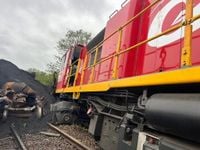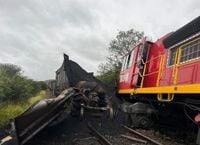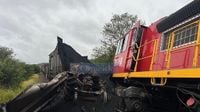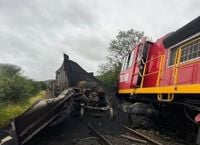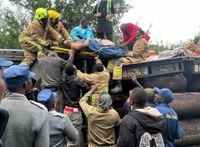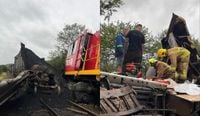A luxury Rovos train carrying 47 international tourists collided with a BBR goods train in the Hantinya area just outside Gwanda, Zimbabwe, on the morning of April 18, 2025. This shocking incident occurred as the Rovos Rail service, which was en route from Cape Town to Dar es Salaam, was making its way to Victoria Falls, a popular tourist destination.
The collision took place around 6:15 AM, when the freight train, traveling from Bulawayo to Beitbridge, struck the passenger train. Eyewitness accounts from the scene describe a scene of chaos and devastation, with twisted metal and overturned carriages strewn across the tracks.
Emergency services responded swiftly, with the Gwanda Fire Brigade leading the rescue efforts. Teams worked diligently to extract trapped passengers and crew members from the wreckage, successfully transporting the injured to Gwanda Provincial Hospital. Fortunately, officials confirmed that none of the tourists sustained life-threatening injuries. However, initial reports indicated that several crew members from both trains were injured, with the total number of injured individuals still being assessed.
As investigations into the cause of the collision continue, questions have arisen regarding how such an incident could occur, especially given the tightly controlled train schedules in the region. Rail safety officials from both Zimbabwe and South Africa are expected to be involved in the ongoing inquiry.
Rovos Rail is renowned for its luxury travel experiences, offering fine dining and elegant accommodations across scenic routes in southern Africa. The BBR freight service, on the other hand, is a vital component of the regional trade corridor, transporting goods between Zimbabwe and South Africa.
This incident has sparked safety concerns across the region's rail network, particularly in light of the recent Easter weekend disaster. Observers have pointed out that the accident is symptomatic of deeper issues within Zimbabwe's rail infrastructure, which has suffered years of neglect and underinvestment.
Public sentiment has been fierce, with many Zimbabweans expressing embarrassment and outrage over the incident. A local tour operator commented, "We are a nation that boasts about Victoria Falls as a world-class destination. But how do we expect the world to take us seriously when we can’t even ensure the safety of a luxury train ride?" This sentiment reflects a broader concern about the state of infrastructure in Zimbabwe.
In response to the accident, Rovos Rail has issued a statement apologizing for the disruption caused to the tourists’ travel plans. The company has assured passengers that they will receive a full refund for the journey, which was interrupted by the collision. The tourists will now complete the remaining 435-kilometer trip to Victoria Falls by road, a journey expected to take up to eight hours due to deteriorating road conditions.
As the investigation unfolds, the spotlight is now on the government’s response to this incident and the broader implications for Zimbabwe’s tourism industry, which is already grappling with challenges such as inflation and power shortages. With the country’s reputation as a premier tourist destination at stake, many are hoping for a thorough investigation that will lead to accountability and improvements in rail safety standards.
In summary, the collision of the Rovos train with the BBR goods train outside Gwanda has raised serious questions about rail safety in Zimbabwe. As authorities work to determine the cause of the accident, the impacts on the tourism industry and the broader infrastructure challenges facing the country will undoubtedly remain in the public eye.
